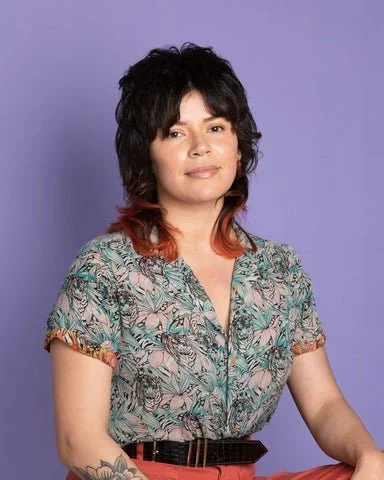STYLISTS TO KNOW: CHI ILOCHI
CHI ILOCHI
Chi Ilochi is a Nigerian-American fashion stylist and image consultant with styling credits in Essence, Teen Vogue, and Newsweek to name a few. Currently based in Pittsburgh, Chi is using her expertise in personal fashion styling to help those struggling with mental illness, physical ailments, autism, and homelessness by providing them with free clothing and styling sessions. While sponsoring scholarships for fashion lovers in her city and in Lagos, Nigeria and August 13th officially declared “Styling By Chi Day” by the mayor of Pittsburgh, Chi is using fashion to heal and inspire in her community and across the globe.
SHEER: Tell us a little bit about yourself and where you're from.
CHI ILOCHI: I’m Chi Ilochi, and I’m a Nigerian American fashion stylist and image consultant from Pittsburgh, Pennsylvania. My story is one of what it means to have God’s grace. My story hasn’t been easy but it’s been worth it. I am someone who has loved fashion since she was a little girl, but found fashion loved me more in my time of need. I am someone who wants every client, creative, and business owner to feel the love of God and acceptance through a gift that was given to me in adolescence.
SHEER: How would you say your cultural/family upbringing impacted your path to becoming a creative?
CI: As an adult, I can say with full assurance that my cultural upbringing has impacted my path to becoming a creative. The style of Nigerians as a whole is colorful, creative, and bold, and it’s safe to say that I emulate that in my personal style and client’s style. Nigerians are known for being creative, and artistic and that is what I do full time, so it was definitely a cultural prophecy if you will haha.
Photographer: Natalie Lacek
Sarah Bednar (model) is such a refreshing talent, working with Sarah made me tap into my reason for choosing to be a fashion stylist, to create art and have fun while doing it. Sarah’s talent is one to be praised, but who she is as a person will take her unimaginable places. I’m blessed to have experienced her before she gets bigger haha.
Natalie (photographer) is an amazing friend, person, and photographer. Working with her over these two years has been a true blessing. I know that Natalie’s gift will take her far, but who she is will live in the hearts of those she encounters forever. I know the sky isn’t her limit, but her staircase.
Photographer: Natalie Lacek
What really sparked my attention aside from her incredible gift, was her infectious spirit. Kimmia Bratcher is the kind of talent that reminds you why you chose a career in fashion. I know that Kimmia will go on to be one of the best models we’ve seen in a long time.
SHEER: What led you to break into fashion and styling specifically and how did you get your start in the industry?
CI: I must say fashion and styling found me. I started off by dressing myself because I loved fashion, and it was my way of expressing myself. After a good friend during my high school years had asked “have you ever thought of being a fashion stylist?” I pursued fashion styling as a career and never looked back. Even after that discovery and career choice, I still didn’t believe I “started” in the industry. For a few years I was still my only client, but once I realized how fashion styling can change your life, I knew I had to share it with others, thus my “start” in the industry. I started off by styling close friends and family for free to gain experience and show I had what it takes to be a stylist. It took a few years to get the ball rolling I must say, but I believe what sustained me and will sustain anyone else looking to “break” into the fashion industry is consistency.
Photographer: Dymond Jewell
Working with Jay (model) has been an honor. Jay is a unique talent, whose abilities are reflected in every photoshoot she has. Jay is going to go far, and I’m so excited to witness.
Dymond Jewell (photographer) is incredible. I’ve learned so much working with Dymond, and I’m so grateful to Gabrielle for putting me on her and her work. Creating with Dymond feels like working with family. There’s no greater feeling than working with an artist who also has a gentle and loving aura. I know that she will go down in history as one of the best.
SHEER: How do you select the clients you choose to style and what do you believe is unique about your styling approach?
CI: I select the clients I choose to style based on how well they align with my company values. I believe intentionality is important in any and every business, and all business isn’t good business. I refuse to work with clients that are homophobic, fatphobic, transphobic, the list goes on. I believe I can help these particular clients' styles evolve but one of my main priorities as a stylist is to make sure that my client feels good and I do as well. I would feel terrible working with these kinds of clients because it’s contradictory to who I am and my styling approach. I believe what makes my styling approach unique is prioritizing my clients well being internally and externally before I put clothing on them. I want all of my clients to feel seen, comfortable and heard, because that is what they deserve, and that is what gives them that killer style. When a client doesn’t feel good internally, it will show in their exterior no matter what I style them in.
SHEER: How important do you believe community and accessibility is to your creative practice? And how are you using your fashion and styling gifts to build and nurture communities?
CI: Community and accessibility is essential to my creative practice, because it is my moral bread and butter. I am using my fashion and styling gifts to build and nurture communities by giving them free access to luxury services and clothing because they are human like you and I.
“I select the clients I choose to style based on how well they align with my company values. I believe intentionality is important in any and every business, and all business isn’t good business. I refuse to work with clients that are homophobic, fatphobic, transphobic, the list goes on”
Photographer: Dymond Jewell
Gabrielle Johnson (model) is the definition of art. Gabrielle’s passion for what she does, and the stories she shares through her art is like none I’ve seen before. It’s an honor to be able to work with her, and watch her grow along her journey.
Photographer: Natalie Lacek
Erin Mykich (model) is a beautiful spirit in and out. On set, it was nothing but laughter and creativity. It is models like Erin that bring back the humanity in the fashion industry that we’ve so desperately needed, and I am so grateful for that. Erin’s artistry is effortless and so fun to witness. Watch out for her rise to the top.
SHEER: In what ways do you believe fashion supports self-esteem and inner healing?
CI: I believe fashion supports self esteem and inner healing because it is an outward extension of it. Fashion can help improve one’s mental health, emotional health, and spiritual health because it allows you to show up as the person you want to be. I believe one of the main reasons healing and self esteem building is so challenging, is because it’s hard to envision who you will be after the pain and insecurity is gone. Fashion allows you to create that healthy and secure version of yourself through clothing, while reminding you that a healthy and confident version of you exists.
SHEER: How do you stay grounded? Creatively, spiritually, mentally, etc?
CI: I stay grounded by writing; playing my Nintendo Switch, walking, painting, and praying. I also stay grounded by surrounding myself with people that inspire me. Good friends of mine, Kendraya Davis (who is an incredible artist and poet), and Maurice (who is an incredible producer, director, and screenwriter) inspire me to be the best I can and remind me that before all of my outward creative extensions I’m a human who deserves to rest, enjoy, and be at ease. When you see my work and what I’ve done, know that it’s much easier to do those things because I have people like Kendraya and Maurice in my life. I don’t know what I’d do without them.
SHEER: What advice would you give creatives from underrepresented groups looking to break into the fashion and styling industries?
CI: Wow. This is a great question. I would first tell them that the missing piece in the fashion and styling industry they’re trying to break into is their authenticity. I would advise them to remain true to themselves, get a mentor that will help you evolve into the best version of yourself, and study your field like the back of your hand. The one thing that will sustain you in the fashion and styling industry is YOU. Your authenticity and person is your currency, so treat it as such.
“Good friends of mine, Kendraya Davis (who is an incredible artist and poet), and Maurice (who is an incredible producer, director, and screenwriter) inspire me to be the best I can and remind me that before all of my outward creative extensions I’m a human who deserves to rest, enjoy, and be at ease. When you see my work and what I’ve done, know that it’s much easier to do those things because I have people like Kendraya and Maurice in my life. I don’t know what I’d do without them.”
SHEER: What do you envision for the future of your creative work?
CI: I envision the future of my creative work as a gallery that they can see themselves in. I plan on creating work that every one of all walks of life, gender, race, and orientation feels safe, heard, reflected and valued in.















By Tiara Starks
Zhané Aliya is a content creator based in the Nashville bringing her own flair to the fashion, lifestyle, and DIY beauty content niches while speaking in-depth about her experiences as a Black creator navigating the platform’s ever-changing algorithm.